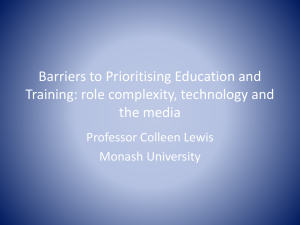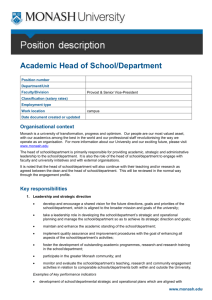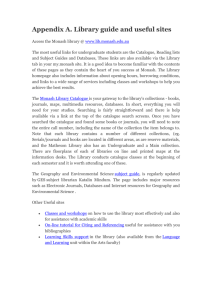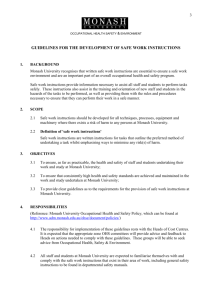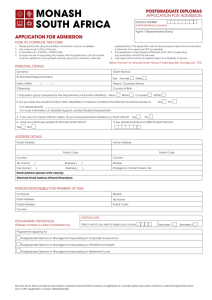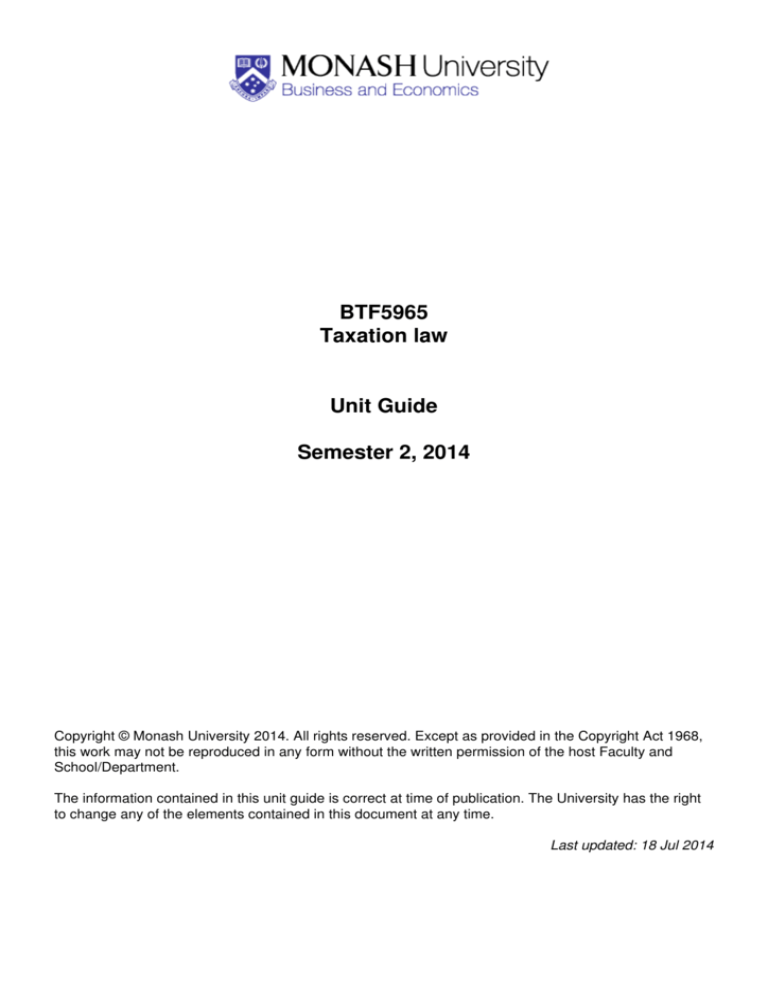
BTF5965
Taxation law
Unit Guide
Semester 2, 2014
Copyright © Monash University 2014. All rights reserved. Except as provided in the Copyright Act 1968,
this work may not be reproduced in any form without the written permission of the host Faculty and
School/Department.
The information contained in this unit guide is correct at time of publication. The University has the right
to change any of the elements contained in this document at any time.
Last updated: 18 Jul 2014
Table of Contents
BTF5965 Taxation law - Semester 2, 2014...............................................................................................1
Mode of Delivery..............................................................................................................................1
Workload requirements....................................................................................................................1
Additional workload requirements........................................................................................1
Unit Relationships........................................................................................................................................1
Prerequisites....................................................................................................................................1
Co-requisites....................................................................................................................................1
Prohibitions......................................................................................................................................1
Chief Examiner(s)........................................................................................................................................2
Campus Lecturer(s).....................................................................................................................................2
Caulfield...........................................................................................................................................2
Tutor(s)........................................................................................................................................................2
Caulfield...........................................................................................................................................2
Your feedback to Us....................................................................................................................................2
Previous Student Evaluations of this Unit....................................................................................................3
Academic Overview...................................................................................................................................4
Learning Outcomes.........................................................................................................................4
Unit Schedule.............................................................................................................................................5
Teaching Approach..........................................................................................................................5
Assessment Summary.....................................................................................................................6
Hurdle Requirements...........................................................................................................6
Second marking...................................................................................................................6
Return of final marks............................................................................................................6
Exam viewing.......................................................................................................................6
Assessment criteria..............................................................................................................7
Assessment Requirements......................................................................................................................8
Assessment Tasks...........................................................................................................................8
Assessment task 1...............................................................................................................8
Assessment task 2...............................................................................................................9
Examination(s).............................................................................................................................................9
Examination 1..................................................................................................................................9
Learning resources....................................................................................................................................10
Feedback to you........................................................................................................................................10
Extensions and penalties...........................................................................................................................10
Assignment submission.............................................................................................................................10
Online submission.........................................................................................................................10
Prescribed text(s) and readings.....................................................................................................11
Recommended Resources........................................................................................................................11
Examination material or equipment...........................................................................................................11
Other Information....................................................................................................................................12
Policies..........................................................................................................................................12
Graduate Attributes Policy.................................................................................................12
Student Charter.........................................................................................................................................12
Student services........................................................................................................................................12
Monash University Library.........................................................................................................................12
Moodle 2....................................................................................................................................................12
Disability Liaison Unit................................................................................................................................13
BTF5965 Taxation law - Semester 2, 2014
The unit covers the concepts of income taxation and the taxation of capital gains in their underlying
historical, social and constitutional contexts. It includes discussion and learning of the policy and
constitutional matrices of taxation, the legal definition of income, taxation of income from personal
services and business, taxation of fringe benefits, indirect taxation of goods and services, taxation of
capital gains, taxation of companies and allowable deductions from gross income in personal and
business contexts.
Mode of Delivery
Caulfield (Evening)
Workload requirements
Minimum total expected workload equals 144 hours per semester
Additional workload requirements
This six credit point unit involves a maximum of three contact hours each week. However, you are
expected to do three hours of personal study on your own for every hour of class contact.
Accordingly, in addition to the 36 hours of class contact, you should plan to spend an additional 108
hours during the semester in study for this unit. The total time commitment expected for this unit is 144
hours (12 hours × 12 weeks). This total time commitment includes time spent in preparing for and
completing assessment tasks, together with time spent in general study, revision and examination
preparation.
Unit Relationships
Prerequisites
Students must have passed one unit from the following: BTX9020, BTX9500, BTX5950 or MBA9002
before undertaking this unit. Students enrolled in Master of Business Law have no prerequisite.
Co-requisites
Students enrolled in 3159 Master of Business Law must undertake BTF5903 whilst also undertaking this
unit.
Prohibitions
BTG9270 and BTX9651
1
BTF5965 Taxation law - Semester 2, 2014
Chief Examiner(s)
Dr Ken Devos
Campus Lecturer(s)
Caulfield
Dr Ken Devos
Campus: Clayton
Phone: +61 3 990 52266
Email: Ken.Devos@monash.edu
Mr Jonathan Teoh
Campus: Clayton
Phone: +61 3 990 55560
Email: Jonathan.Teoh@monash.edu
Tutor(s)
Caulfield
Mr Toan Le
Campus: Peninsula
Phone: +61 3 990 34189
Email: Toan.Le@monash.edu
Ms Georgia Afionis
Campus: Caulfield
Email: Georgia.Afionis@monash.edu
Your feedback to Us
Monash is committed to excellence in education and regularly seeks feedback from students, employers
and staff. One of the key formal ways students have to provide feedback is through the Student
Evaluation of Teaching and Units (SETU) survey. The University’s student evaluation policy requires that
every unit is evaluated each year. Students are strongly encouraged to complete the surveys. The
feedback is anonymous and provides the Faculty with evidence of aspects that students are satisfied
and areas for improvement.
For more information on Monash’s educational strategy, see:
www.monash.edu.au/about/monash-directions/ and on student evaluations, see:
www.policy.monash.edu/policy-bank/academic/education/quality/student-evaluation-policy.html
2
BTF5965 Taxation law - Semester 2, 2014
Previous Student Evaluations of this Unit
If you wish to view how previous students rated this unit, please go to
https://emuapps.monash.edu.au/unitevaluations/index.jsp
3
Academic Overview
Learning Outcomes
The learning goals associated with this unit are to:
1. identify conceptual structures in the core income tax provisions and apply them in an ordered
approach
2. understand fundamental tax concepts to determine income and deductions, and together with
appropriate judicial principles, apply them to personal, business and property scenarios
3. calculate income tax, CGT and GST liabilities; and the taxable value of fringe benefits
4. understand the operation of the taxation system; the interaction of GST with other taxes; and
some tax accounting principles.
4
Unit Schedule
Week
Activities
0
Assessment
No formal assessment or activities are
undertaken in week 0
1
Unit Introduction. Overview of Australian Taxation
Laws. Constitutional and Tax Policy Aspects.
2
Indirect Tax: Goods and Services Tax.
3
Income Tax - Key Concepts: Taxable Entities;
Sources of Income Tax Law; Tax Payable Formula:
Income, Deductions, Rates, Levies and Charges;
Selected Tax Offsets; Exempt Income and
Non-Assessable Non-Exempt Income; Residence and
Source.
4
Assessable Income: Ordinary Concept of Income (s
6-5 ITAA97); Common Law Principles. Income from
Personal Services and Employment.
5
Non-Cash Benefits Arising From Employment: Fringe
Benefits Tax.
6
Income from Business: Business v Hobby, Normal
Proceeds of a Business, Non-Cash Business Benefits,
Tax Accounting; Trading Stock.
7
Income from Extraordinary and Isolated Transactions.
Compensation for Business Losses. Income from
Property.
8
Capital Gains Tax: CGT Events; CGT Assets;
Concessions; Exemptions; Calculating CGT Liability.
9
General Deductions.
10
General Deductions (Continued). Specific Deductions:
Repairs; Capital Allowances; Capital Works.
11
Other Deductibles. Provisions Limiting Deductibility:
Non-Commercial Business Losses, Related Parties,
Substantiation. Assessments and Penalties.
12
Revision.
In-Semester Test: Friday 19 September
2014 at 6:15pm
Online Test: Online via unit Moodle site.
Available Monday 13 October 2014 from
12:05am to 11:55pm. 60 minutes sitting
time.
SWOT VAC
No formal assessment is undertaken
SWOT VAC
Examination period
LINK to Assessment Policy:
http://policy.monash.edu.au/policy-bank/
academic/education/assessment/
assessment-in-coursework-policy.html
Teaching Approach
• Lecture and tutorials or problem classes
This teaching and learning approach provides facilitated learning, practical exploration and peer
learning.
•
5
Unit Schedule
Assessment Summary
Within semester assessment: 30%
Examination: 70%
Assessment Task Value
Due Date
In-Semester Test
20%
Friday 19 September 2014 at 6:15 pm AEST
Online Test
10%
Monday 13 October 2014
Examination 1
70%
To be advised
Hurdle Requirements
There is a hurdle requirement in this unit.
The learning outcomes in this unit require students to demonstrate in the final summative assessment
task a comprehensive understanding of the topics covered in the unit. This is demonstrated by the
requirement that the student must attain a mark of at least 40% in the final exam.
A student's final mark is normally the sum of the marks obtained in all of the individual assessment items
in the unit. Where a student fails the unit solely because of failure to satisfy the hurdle requirement, a
mark of 48% will be returned for the unit.
Second marking
Where an assessment task is given a fail grade by an examiner, that piece of work will be marked again
by a second examiner who will independently evaluate the work, and consult with the first marker. No
student will be awarded a fail grade for an assessment task or unit without a second examiner confirming
the result.
Note: Exceptions to this are individual pieces of assessment contributing 10% or less of the final mark,
unless the total of such pieces exceeds 30% of the final mark.
Return of final marks
Faculty policy states that 'the final mark that a student receives for a unit will be determined by the Board
of Examiners on the recommendation of the Chief Examiner taking into account all aspects of
assessment'.
The final mark for this unit will be released by the Board of Examiners on the date nominated in the
Faculty Calendar. Student results will be accessible through the my.monash portal.
Exam viewing
The Department of Business Law and Taxation will set out examination script book viewing times.
Further details are available at:
http://www.buseco.monash.edu.au/blt/student/exam-view/index2.html
6
Unit Schedule
Assessment criteria
Assessment Criteria Grading Descriptors available at:
http://www.buseco.monash.edu.au/esg/agu/policies/assessment.html.
7
Assessment Requirements
Assessment Tasks
•
Assessment task 1
Title:
In-Semester Test
Due date:
Friday 19 September 2014 at 6:15 pm AEST
Details of task:
The test will be conducted in an invigilated (supervised) environment where candidates
will be required to respond to problem-based question(s). The question will be focused on
the prescribed materials from weeks one to six, inclusive.
Duration: 10 minutes reading and noting time plus 75 minutes writing time.
Venue: To be advised.
Date & Time: Friday 19 September 2014, commencing at 6:15pm AEST. Please
remember to bring your student identification card.
Permitted materials: The in-semester test is closed book with the exception that
candidates can take in three (3) A4 sized pages of their own hand written/typed notes and
an approved calculator. An approved is a calculator that bears the Monash University,
Faculty of Business and Economics "Approved for Use" sticker.
Weighting/Value:
20%
Estimated return date:
Barring unforeseen circumstances, test results should be made available via the unit
Moodle site on Friday 17 October 2014
Criteria for marking:
Responses to the test questions will be assessed based on:
1. Identification of correct legal issues and sub-issues;
2. Articulation of arguments and application of law to facts; and
3. Depth of analytical thinking shown in reasoning and calculations.
Learning objectives assessed:
This assessment task assesses Learning Objectives 1, 3 and 4 inclusive.
Penalties for late lodgement:
Failure to complete and submit the in-semester test without Special Consideration
approved by the Chief Examiner will result in a result of zero marks being returned for
Assessment Task 1.
Additional information:
Students registered with the Disability Liaison Unit that have Alternative Assessment
Arrangements for examinations should contact the Chief Examiner by Friday 12
September 2014.
8
Assessment Requirements
•
Assessment task 2
Title:
Online Test
Due date:
Monday 13 October 2014
Details of task:
The online test will be held via the unit Moodle site and will be available on Monday 13
October 2014 from 12:05am until 11:55pm. Sixty (60) minutes writing time, with no
reading time. The writing time starts from the time the candidate opens/starts the test on
Moodle.
Multiple choice test focuses on the prescribed materials from weeks eight and nine,
inclusive.
Weighting/Value:
10%
Estimated return date:
Barring unforeseen circumstances, online test results should be made available via the
unit Moodle site on Friday 17 October 2014.
Learning objectives assessed:
This assessment task assesses Learning Objectives 2 and 4.
Penalties for late lodgement:
Failure to complete and submit the online test without approved Special Consideration
approved by the Chief Examiner will result in a result of zero marks being returned for
Assessment Task 2.
Examination(s)
• Examination 1
Weighting:
70%
Length:
3 hours
Type (open/closed book):
Open book
Hurdle requirements:
The learning outcomes in this unit require students to demonstrate in the final summative
assessment task a comprehensive understanding of the topics covered in the unit. This is
demonstrated by the requirement that the student must attain a mark of at least 40% in
the final summative assessment task.
A student's final mark is normally the sum of the marks obtained in all of the assessment
tasks in the unit. Where a student fails the unit solely because of failure to satisfy the
hurdle requirement, a mark of 48 will be returned for the unit.
Electronic devices allowed in the exam:
Electronic Dictionaries are not permitted
Remarks:
The final examination is 'open book'. This means you can take into the exam any written
or printed materials (including your notes and text books).
The examination will require you to analyse the issues arising out of problem based
scenarios, apply various legislation and case law principles to address the issues and
9
Assessment Requirements
support your argument in order to reach a conclusion based on your better argument.
Further details will be provided closer to the date of the final examination.
Copies of past examinations are available on the unit Moodle site.
Learning resources
Monash Library Unit Reading List (if applicable to the unit)
http://readinglists.lib.monash.edu/index.html
Feedback to you
Types of feedback you can expect to receive in this unit are:
• Informal feedback on progress in labs/tutes
• Test results and feedback
• Quiz results
Extensions and penalties
Application for Special Consideration
In-Semester Assessment Tasks
In relation to Assessment Task 1 and/or 2 (as above), all Applications for Special Consideration
(In-Semester Assessment Task) must be made using the form available on the unit Moodle site.
Please ensure that you provide accepted documentary evidence to support your application and submit
your application to Ken Devos (the Unit Coordinator) no later than two University working days after the
due date for the piece of work.
Final Examination
In relation to special consideration for the final examination, please contact Student Services at the
Faculty of Business and Economics on your home campus for further information.
For further information, refer to the Faculty of Business and Economics Special Consideration Policy
at: http://www.buseco.monash.edu.au/student/policy-procedures/special-consideration-student-procedures.html
Penalties for In-Semester Assessment Tasks
Penalties for late lodgement of Assessment Tasks 1 and 2 are stated above.
Assignment submission
Online submission
If Electronic Submission has been approved for your unit, please submit your work via the learning
system for this unit, which you can access via links in the my.monash portal.
10
Assessment Requirements
Prescribed text(s) and readings
The prescribed texts for this unit are as follows:
1. Kerrie Sadiq, Cynthia Coleman, Rami Hanegbi, Sunita Jogarajan, Richard Krever, Wes Obst and
Antony Ting, Principles of Taxation Law, Thomson Reuters, 2014.
2. Richard Krever, Australian Taxation Law Cases, Thomson Reuters, 2014.
3. Stephen Barkoczy, Core Tax Legislation and Study Guide, (17th edn), CCH Australia, 2014.
4. Les Nethercott, Grant Richardson and Ken Devos, Australian Taxation Study Manual, (24th edn),
CCH Australia, 2014.
Owing to significant changes in the Australian taxation law, the use of earlier editions of the above texts
is not recommended. If, for whatever reason you only have access to earlier editions of the prescribed
texts, it is your own responsibility to determine whether any parts have been superseded by
changes in the law.
The prescribed texts will be available from the Monash University bookshop and can be purchased in
two packs. The first pack, by Thomson Reuters, contains textbooks one and two. The second pack, by
CCH Australia, contains textbooks three and four.
Recommended Resources
The recommended texts and resources for this unit are as follows:
• Woellner, Barkoczy, Murphy, Evans and Pinto, Australian Taxation Law (latest edn), CCH
Australia.
• Barkoczy, Foundations of Taxation Law, (latest edn), CCH Australia.
• Barkoczy, Australian Tax Casebook, (latest edn), CCH Australia.
• Australian Master Tax Guide (latest edn), CCH Australia.
Useful internet sites
The following internet sites contain very useful information on taxation matters:
• Australasian Legal Information Index: http://www.austlii.edu.au (an excellent source for legislation
and cases).
• Australian Taxation Office: http://ato.gov.au (an excellent source for Rulings and ATO information
for taxpayers).
• Comlaw: www.comlaw.gov.au (an excellent source for legislation and regulations).
Examination material or equipment
This subject has an open book exam. Candidates are able to take in prescribed text books, hand
written/typed notes, copies of relevant legislation and an approved calculator. An approved calculator is
essential for tutorials, the assignment and examination. It is the candidates responsibility to bring an
approved calculator to the examination.
An approved calculator is a calculator that bears the Monash University, Faculty of Business and
Economics "Approved for Use" sticker.
11
Other Information
Policies
Monash has educational policies, procedures and guidelines, which are designed to ensure that staff and
students are aware of the University’s academic standards, and to provide advice on how they might
uphold them. You can find Monash’s Education Policies at:
www.policy.monash.edu.au/policy-bank/academic/education/index.html
Key educational policies include:
• Student Academic Integrity Policy and Student Academic Integrity: Managing Plagiarism and
Collusion Procedures ;
• Assessment in Coursework Programs;
• Special Consideration;
• Grading Scale;
• Discipline: Student Policy;
• Academic Calendar and Semesters;
• Orientation and Transition; and
• Academic and Administrative Complaints and Grievances Policy.
Graduate Attributes Policy
http://www.policy.monash.edu/policy-bank/academic/
education/management/monash-graduate-attributes-policy.html
Student Charter
www.opq.monash.edu.au/ep/student-charter/monash-university-student-charter.html
Student services
The University provides many different kinds of support services for you. Contact your tutor if you need
advice and see the range of services available at http://www.monash.edu.au/students
Monash University Library
The Monash University Library provides a range of services, resources and programs that enable you to
save time and be more effective in your learning and research. Go to www.lib.monash.edu.au or the
library tab in my.monash portal for more information.
Moodle 2
All unit and lecture materials, plus other information of importance to students, are available through the
virtual learning environment Moodle site. You can access Moodle via the my.monash portal.
Where to go for help
If you're stuck, confused or simply not sure how to approach Moodle, there are a number of Moodle
resources that you can tap into.
12
Other Information
Disability Liaison Unit
Students who have a disability or medical condition are welcome to contact the Disability Liaison Unit to
discuss academic support services. Disability Liaison Officers (DLOs) visit all Victorian campuses on a
regular basis.
• Website: http://www.monash.edu/equity-diversity/disability/index.html
• Telephone: 03 9905 5704 to book an appointment with a DLO;
• Email: dlu@monash.edu
• Drop In: Equity and Diversity Centre, Level 1, Building 55, Clayton Campus.
Reading Program & Tutorial Program
Please see unit Moodle site for:
• Reading Program;
• Tutorial Program
13


